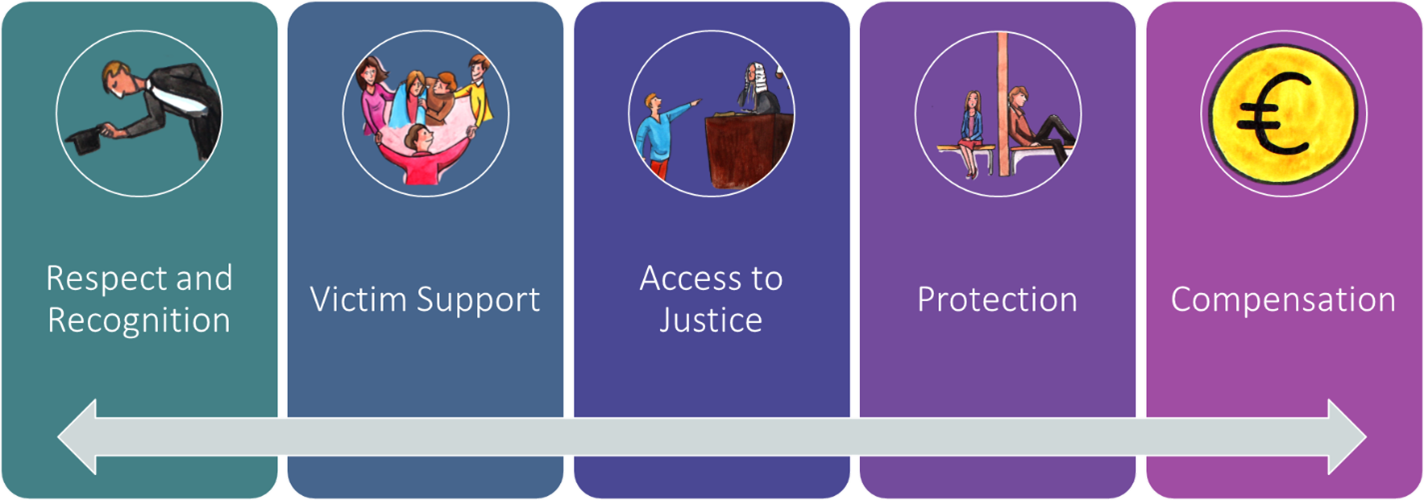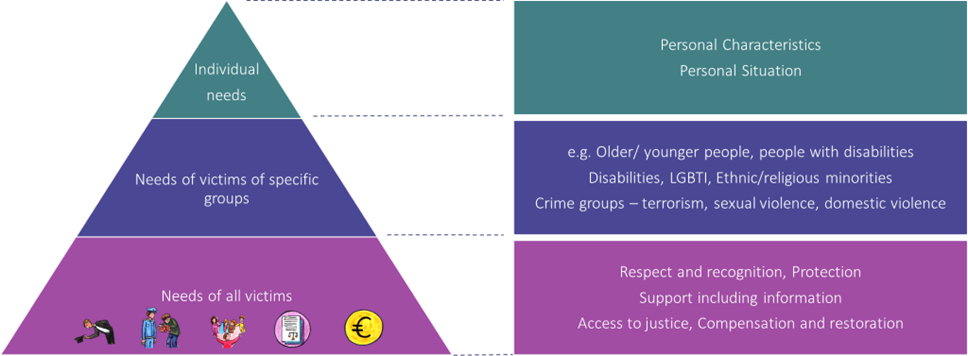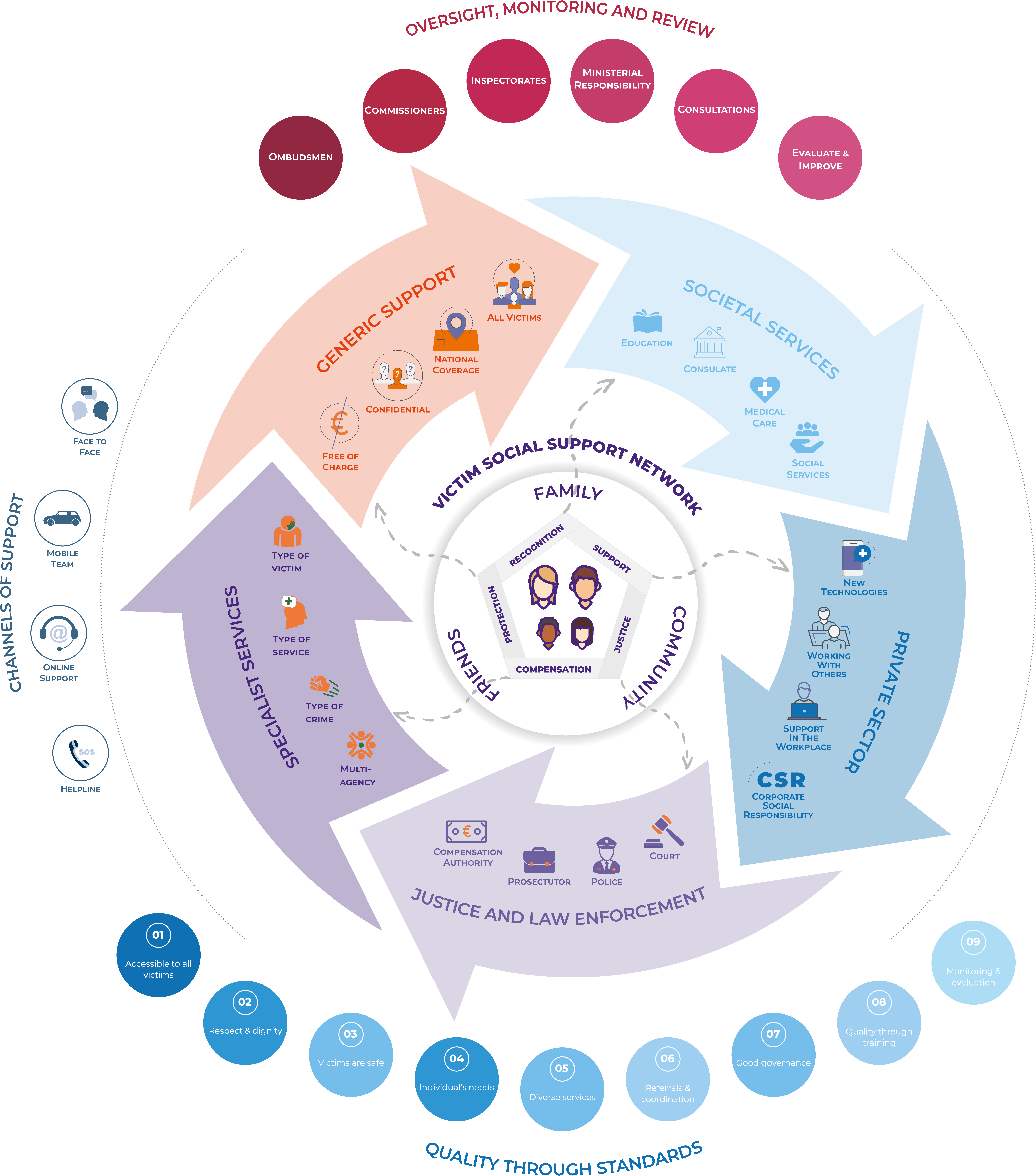Supporting victims of crime should not be about setting up and funding a single victim support organisation. Rather, victim support should be one important part of an entire victim-centred system consisting of different elements, including societal services, justice and law enforcement and even the private sector. This is what we call a National Framework for Comprehensive Victim Support.
When discussing victim support it is common to think immediately of professional support organisations. However, there are many other services that can and should be included in a network for comprehensive victim support. Undoubtedly, the most well-known organisations are generic victim support services, which means that they offer their services to all victims of crime. Organisations which fall into this category should be offering the range of services in line with Article 9 of the Victims’ Rights Directive. This does not mean that victim support services always offer all of the services listed in Article 9. Support can be offered through a range of organisations, which brings us to specialist services.
Specialist services are a necessary part of a comprehensive system. Such organisations have the capacity to deliver bespoke services focused on the:
- type of victim (children, persons with disabilities, LGBTI+, etc.)
- type of crime (domestic violence, child sexual exploitation, etc.)
- type of service (psychological therapy, legal assistance, etc.)
Multi-agency support also falls into the specialist services category and is often described as a ‘one stop shop’. An example of these can be seen through the Barnahus model of support for child victims, or the MARACs (Multi-Agency Risk Assessment Centres) for high risk domestic violence victims.
Both generic and specialist support services should be able to provide support through various channels, such as face-to-face direct support, mobile services, online support and telephone helplines. A multitude of communication channels working in conjunction with each other maximises the accessibility of services, whilst taking into consideration the individual communication needs of each victim. Making sure that no victim falls through the gaps.
Societal services also have an essential role to play in delivering support to victims of crime. These services include schools, embassies and consulates, and medical as well as social services. These institutions should have a wider understanding of victimisation issues, how to identify victimisation and how to incorporate this into their daily interactions. Some examples include psychological first aid training and recognising signs of victimisation.
The private sector, though not an obvious provider of victim support, should play a wide-ranging role in helping to deliver support. Starting with their own workplace, companies can operate in a significantly more victim-friendly way with respect to their own staff. This starts with creating a safe environment and correct conditions for victims to come forward: confidentiality policies, flexible working hours for victims to attend court, medical appointments, and a supportive approach to leave, helping victims recover in the time they need.
Partnership between the private sector and law enforcement is also essential as these partnerships are used to identify victims. For example, as hotels are commonly used for trafficking, staff can be trained on indicators of a trafficking situation. Social media companies can incorporate measures to identify online crime victims and connect them with local police services and support organisations. Corporate Social Responsibility programmes can also be used to support victims.
The final category is justice and law enforcement. How these professionals and institutions engage with victims can have the deepest possible impact; from re-traumatising a victim, to supporting recovery and building resiliency. These actors also hold the key to the victim’s ability to participate positively and actively in criminal proceedings. All frontline professionals working in justice and law enforcement should be provided with ongoing training of appropriate and correct communication and conduct with victims of crime, in order to minimise secondary victimisation within their institutions.
With all these different sectors working in unison, Quality standards for victim support ensure that all victim services meet a certain threshold in the deliverance of support. Victim Support Europe has created its own set of standards for its member organisations which seek to ensure that all victims’ needs are met and all their rights are accessible in practice. You can find these standards in the previous section designed for victim support professionals.
Finally, for a national framework to succeed, it is not sufficient that all these sectors establish victim-friendly approaches. There must be mechanisms in place to regularly review and monitor victim strategies, and to look forward in the aim of continual improvement.




